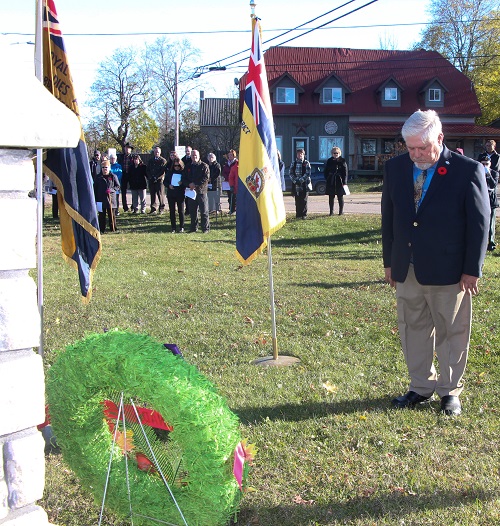
Pastor Kevin Moratz gave the chaplain’s address at the Remembrance Day service held in Beachburg on Sunday, Nov. 4.
There are many things I know, but far more that I don’t know. One thing I know is that I was fortunate in my childhood to grow up in a world of peace, shielded from most conflicts that were happening, as I was too young to remember the cold war or the Cuban missile crisis and my only interaction with the Vietnam War was in meeting a few of the original hippies when, as a teenager, I worked clearing out some bush roads back in the hills of Killaloe.
Of course through my high school studies, I knew about the Second World War and Nazi Germany. I did know for certain that my dad parachuted behind enemy lines on D-Day June 6th, 1944 and he lasted a week before being wounded. What I never knew was what other wounds he harboured as he never, as far as I can remember, ever spoke about being ‘in action.’
But I’m sure he knew why he had enlisted back in 1940. He had seen – correctly – the real threat of Nazi Germany. He had simply done the only thing he could do to oppose it.
And so this day has a special meaning for me as his sacrifice, along with the so many others we remember today, allowed me to grow up in a world that seemed, at least from my vantage point, to be at peace.
While I was growing up I knew that there were, of course, other conflicts, little wars that seemed far off: in Africa, sometimes; in Central America; and in the Middle East, involving the state of Israel. Eventually, also came wars between Iran and Iraq, wars in Cambodia, in the Balkans, and between India and Pakistan. Then came the first Iraq war, and the Russia-Afghanistan war, and Rwanda. Then 911 and the US-Afghanistan war, then another war in Iraq, the Ukraine and now in Syria and Yemen.
And others too numerous to mention. So, I know that this will not be the last time we gather around this cenotaph to remember and reflect on what we need to learn in order to stop the insanity.
Do you know that word cenotaph is Greek for empty tomb. So, we gather to remember those whose graves are elsewhere – close, perhaps, to where they fell, cognizant of the fact that this year is the 100th anniversary of the war to end all wars, to the end of the Great War, now referred to as WW1. We gather to also remember all the victims of war, both military and civilian – the millions of people whose lives have been snuffed out, often in the prime of youth – men, women, children, in the name of ancient hatreds, or simply because of a lust for power and domination. We gather to remember especially those who gave their lives in willing sacrifice, and in so doing, proved that love is stronger than hate. We gather to remember those who gave their all, in times long past as well as those, who only recently, have given their lives in the cause of bringing peace to the troubled and chaotic parts of this world.
We might not like to think about it, but sooner or later all graves become empty tombs, as our bodies return to dust and ashes. In the words of the hymn, ‘Time, like an ever-rolling stream, bears all of us away; we fly, forgotten, as a dream dies at the opening o day.’ Death, like nothing else can strike fear into the bravest of hearts, but it is when the fear of death becomes our fear of life that we are most venerable.
Whether we are people of Christian faith, or other faith, or even of no formal faith, our culture has long been inspired by another group of people who gathered at an empty tomb, believing Death had had the last word, that life was inevitably tragic and reduced to mere survival. The surprise of that empty tomb was that its victim of tyranny and oppression was not a victim a all, and the result of his voluntary sacrifice was the realization that death no longer had dominion over him, or over those who embraced him.
What changed a defeated, frightened group of men and women into a community overflowing with life was their discovery that life has been transformed from tragedy into hope, that death no longer has the last laugh, that love and life are stronger than death.
We live, regrettably, in a world in which, even for many who claim to be Christian life, is tragic and fearful. Our fear of one another leads us to build more and more walls, to lock our doors, to be suspicious of strangers, to narrow the circles of trust until, suddenly, we feel we are all alone against the world. But the good news of our remembrance, of that first empty tomb and of the cenotaphs which commemorate all who have given their lives for us, is that we need not give in to tyranny and death, that we need not, because of fear, surrender our freedom to live and to love. Because of one great sacrifice long ago, and of many others since, we need no longer be ruled by the fear of death which becomes the fear of life. And so we remember, and give thanks, knowing we are freed to find ourselves by living, not for ourselves alone, but with and for others.


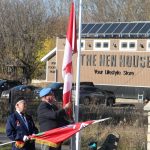
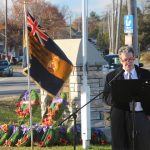
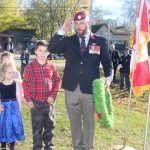

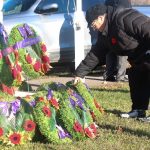

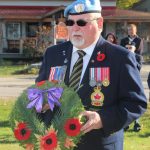
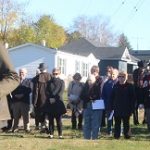

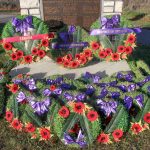

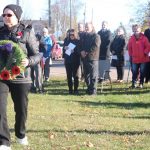




![Kenopic/Smith Auction [Paid Ad]](https://whitewaternews.ca/wp-content/uploads/2018/10/advertising-100x75.jpeg)

